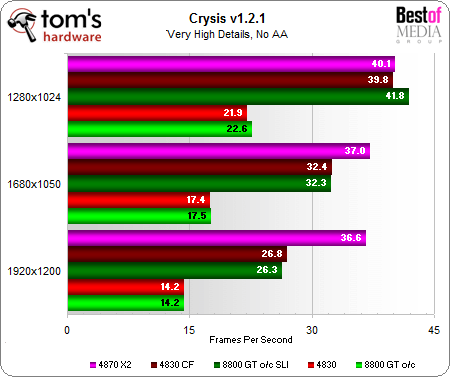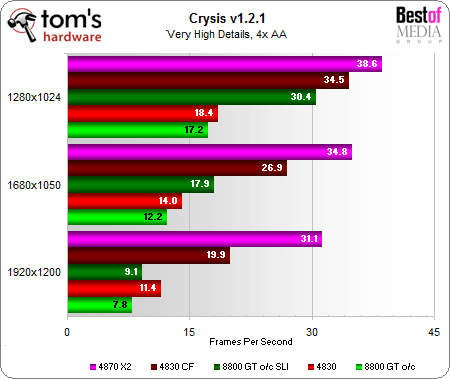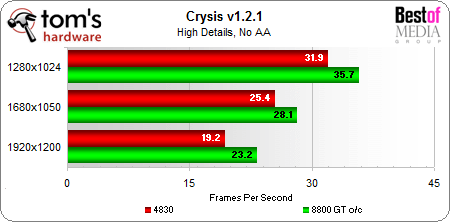Radeon HD 4830: High-Speed, Cheap CrossFire
Benchmark Results: Crysis
Advanced first-person shooters like Crysis are notoriously dependent on graphics power to provide smooth game play. Let’s see how these cards handle these titles, starting with Crysis:
It doesn’t get any closer than that, folks. The 4830 seems to match the overclocked 8800 GT in both single- and dual-card configurations. We can see a slight advantage with two 8800 GTs in SLI, but the fact that it’s beating the Radeon HD 4870 X2 by a slight amount suggests a CPU bottleneck.
A great deal of this benchmark is academic, because neither card can supply a playable frame rate at very high settings unless they’re paired in an SLI or CrossFire configuration. And even then, 1680x1050 performance is barely playable. It is notable that the Radeon HD 4870 X2 seems unfettered by the higher resolutions.
Let’s see what happens when we add 4x anti-aliasing (AA) and 8x anisotropic filtering (AF) to the mix:
Here we see the Radeon HD 4830 really surpass the 8800 GT. But once again, the result is academic, since the game isn’t playable at these settings. And even dual-card configurations can only run the game at 1280x1024. The Radeon HD 4830 seems to have a solid lead over the 8800 GT and we can’t really blame the 750i’s lower SLI bandwidth, as it has manifested itself in single-card configurations where this wouldn’t be an issue.
However, this result is puzzling, as we’ve come to expect the GeForce 8800 GT to surpass the 4830 when it comes to Crysis--traditionally favoring the GeForce architecture. On a hunch, we benchmarked the game once more using only single cards and this time, we use the High setting instead of the Very High setting with no AA enabled:
At this lower detail setting--and the one most popularly benchmarked--the GeForce 8800 GT shows its strength. It seems that the Radeon HD 4830 has more power to handle difficult shader operations when pushed really hard. But when detail is lowered a bit, the 8800 will take the Crysis crown.
Get Tom's Hardware's best news and in-depth reviews, straight to your inbox.
Notably, we can see that Crysis is playable with a single 4830 or 8800 GT card at lower detail levels. In our real-world experience, lowering even more detail levels can allow for playable 1920x1200 Crysis game play on these cards.
Current page: Benchmark Results: Crysis
Prev Page Synthetic Benchmarks: 3DMark Vantage Next Page Benchmark Results: Far Cry 2Don Woligroski was a former senior hardware editor for Tom's Hardware. He has covered a wide range of PC hardware topics, including CPUs, GPUs, system building, and emerging technologies.
-
Doltron If you couldn't get Tray Tools to work with the Sapphire card why not use another program? Instead of giving up and coming up with a lame conclusion.Reply
Also 993*2 doesn't equal 1885 and the 4870 is clocked at 750 not 780.
Your sound and temp charts have FPS on their X axis. -
hannibal It's nice to see good cards from both companies, ATI and NVidia!Reply
And the price is not bad at all. The competition is so good!
-
neiroatopelcc The chart on page two sais 4850 runs at 625 - but stock is 600, and 4870 at 780 - which is 750 stock ... so is the 4830 speed correct?Reply -
V3NOM I'm sure i saw that "4850 - smarter by design" article at anandtech first. or somewhere else... the name anyway not necessarily the article >.>Reply -
giovanni86 I knew that the 8800GT wasn't that fast, but those benchmarks ahve to be wrong... Sorry Nvidia fan boy here. Bye.Reply -
V3NOM Um actually, the MSI runs at x16/x8 in SLI mode. If you instead got an evga 750i FTW motherboard, you would find it runs at x16/x16 in sli, thanks to its unlocked NF200 chip. the 750i FTW is not a reference nvidia board as the MSI is.Reply


